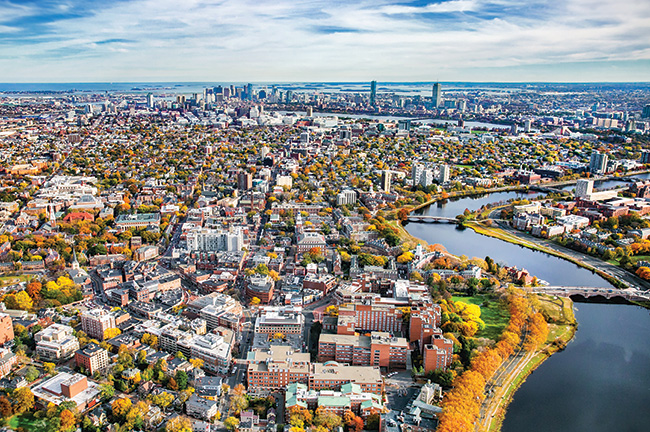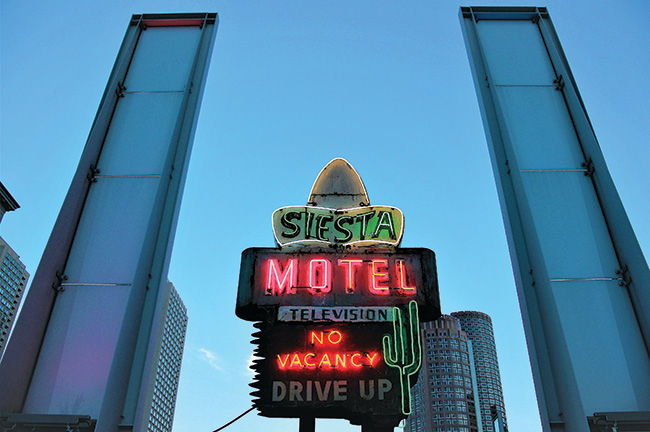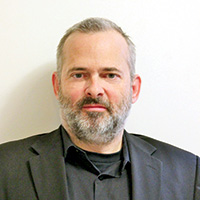On October 1, 1768, British troops commenced their oppressive occupation of Boston. Seven years later, at the Battles of Lexington and Concord, the “shot heard around the world” ignited the American fight for independence.
Over Columbus Day weekend 2018, 150 Redcoat reenactors “occupied” the city’s streets, restaurants, bars and hotel lobbies before camping overnight on Boston Common.
Also featuring drills and demonstrations, “Boston Occupied: An Insolent Parade” was the launch event of Revolution 250, a consortium of 30 local organizations commemorating the 250th anniversaries of the actions that catalyzed the American Revolution.
“The 250th anniversary of the Revolution is a critical moment for Boston and its visitor industry,” said Pat Moscaritolo, president and CEO of the Greater Boston CVB, a principal member of the consortium.
“Like the bicentennial, these anniversaries can create a roadmap and momentum for Boston’s visitor economy, generating ideas and partnerships that focus on big-picture concepts as we approach the 250th anniversary of the country’s founding in 2026, and the 400th anniversary of Boston’s founding in 2030,” he added.
Building on this brand bedrock, the continuing expansion of Boston’s business and tourism infrastructure has profoundly transformed the city’s identity. Moscaritolo calls it “a revolution of opportunity,” which for groups is producing a major uprising.
Boston Makes Monumental Meetings Moves
Multiple drivers have transformed Boston over the past two decades.
“Hosting FIFA World Cup games in 1994 was key in branding Boston, Cambridge and New England as an international destination,” Moscaritolo said. “Then, we had around 750,000 overseas visitors. Today, it’s 1.65 million, or 2.5 million counting Mexico and Canada.”
Airlift expansion is another key factor.
“We now have nearly 60 international direct flights serving Boston, with nearly 40 million passenger arrivals,” continued Moscaritolo, who was director of Logan Airport before joining the bureau in 1991.
“When I left, it was 12 million,” he continued. “And now there’s a $750 million, 10-year plan to transform Terminal E along with other facilities and transit connections, which will only make Boston more desirable for international groups.”
[Related Content: Q&A With David Gibbons, Executive Director, MCCA]
Synergy between Boston’s powerhouse innovation economy and schools creates significant group demand. One example among many is the MIT Sloan Sports Analytics Conference.
Hatched in an MIT classroom in 2006, this annual event, presented by ESPN, quickly outgrew the Hynes Convention Center and now resides in the Boston Convention & Exhibition Center (BCEC).
“The 2018 convention attracted around 4,000 attendees, one-third from around the globe,” Moscaritolo said. “And speaking of the BCEC, I’d say authorization for the building in 1997 was the single most impactful turning point for Boston’s group market image.
“Then, we were ranked around 35th nationally for meetings,” he added.
“For 2019, looking at future bookings and forward demand, global travel management company Carlson Wagonlit Travel ranked Boston fourth among North American meeting destinations,” Moscaritolo continued. “This year, U.S. News and World Report ranked Boston first in the U.S. and third globally behind Paris and Florence for summer travel. Those designations strongly validate our presence in the group and tourism markets."

Boston Aerial View, Credit: Kyle Klein
The entire region is benefitting. At its Tourism Summit 2018, the North of Boston CVB reported generating more than $100 million in international travel expenditures.
Affirmative, too, are the numbers from the Massachusetts Convention Center Authority (MCCA), which owns and operates the BCEC and Hynes as part of its local and state portfolio.
In 2017, the MCCA hosted 325 events with 850,000 attendees at the BCEC and Hynes alone, generating 615,000 hotel room nights and $735 million in economic impact.
Moscaritolo also cites the parallel growth in hotels.
“In 1991, we had some 12,000 rooms in Boston and Cambridge,” he said. “Today it’s 25,000, with 35-plus new hotels producing a potential 5,000-plus rooms planned for Greater Boston in the next five years.”
[On the Scene: Boston Park Plaza Is an Urban Oasis]
Major projects include the two-tower, 1,055-room LEED Silver Omni Boston Hotel at the Seaport. Breaking ground in May 2018 for a scheduled February 2021 opening, highlights include approximately 100,000 square feet of flexible space with direct, conditioned access to the BCEC, including Boston’s largest hotel ballroom, at 25,000 square feet.
Barring any licensing hurdles from the Massachusetts Gaming Commission, the renamed 671-room Encore Boston Harbor is slated for a June 2019 debut. Groups will have 50,000 square feet of space, an outdoor event venue and water taxi service to Logan Airport.
Construction is underway on a 346-room Marriott Moxy Hotel in Boston’s Theater District, while openings include the 220-room Courtyard Boston Downtown North Station, part of a $165 million mixed-use development adjacent to the TD Garden and North Station.
“Neon” Signs of the Times in Boston
From this summer’s installation of vintage neon signs on the Rose Kennedy Greenway, the urban downtown park featuring some 400 free public events and the popular Trillium beer garden, to the stirring discoveries in Minute Man National Historical Park running between Lexington and Concord, revival is dominant in the Boston experience.

Boston Vintage Neon Sign, Credit: Jeff Heilman
That includes the resurgent theater scene, once the proving ground for Broadway. Emerson College, nationally preeminent for its arts, theater and communications programs, is giving Moulin Rouge! The Musical its pre-Broadway run at its gilded Emerson Colonial Theatre across from Boston Common.
Emerson’s portfolio includes the Cutler Majestic and Paramount Center in the nearby theater district, once the notorious Combat Zone.
Other group-capable cultural venues include the 3,500-seat national landmark Wang Theater, featuring one of the five largest stages in the country, and American Repertory Theater in Cambridge.
Greater Boston CVB Information
Cambridge Office for Tourism
617.441.2884
Greater Boston CVB
617.536.4100
Greater Merrimack Valley CVB
978.459.6150
North of Boston CVB
978.465.6555







